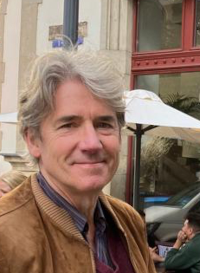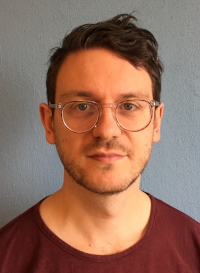Keynote SpeakersKeynote SpeakersScott deLahunta, Coventry University (Wednesday 7th February)Scott deLahunta is Professor of Dance, Centre for Dance Research, Coventry University and co-Director of Motion Bank, hosted by Hochschule Mainz University of Applied Sciences. His research seeks to deepen and apply the understanding of dance as a skilful bodily practice. This builds on over a decade of working within contemporary dance companies as research director and facilitator. Since 2010, he has held a research position at Coventry University and assisted in setting up the Centre for Dance Research in 2015.
Software for DancersPiecemaker was a video annotation software used by The Forsythe Company in Frankfurt from 2007-2013 to aid the ensemble in recalling material they were working on in the studio in the context of choreographic creation. Most of the annotations were made live, with a static camera, while creative work was happening. These recordings were never intended to be made public. In 2010, the Motion Bank project took on the task of developing this software for wider public use in the dance community. Since then, different versions have been made and used for several projects. This development has been supported with research funding from various sources, and the software is now completely open source. Crucially, the focus has remained on making a digital (documentation) tool that is usable and useful for dance practitioners, both artists and educators. This focus will form the core of this talk, including insights into methods into language-use gained from the Motion Bank research. I will reflect on the nature of dance processes and knowledge to address some critical questions that come up in the context of developing usable and useful software for dancers. I will lightly trace a history of this from the multimedia 1990s to the current data-driven and AI preoccupied present, and speculate on what this might mean for the understanding and valuing of bodily practices.
Melvin Wevers, University of Amsterdam (Thursday 8th February)Melvin Wevers is an Assistant Professor in Digital History at the University of Amsterdam. He is also the director of the Cultural Analytics and AI Lab (CANAL). My research interests include the modeling of cultural-historical processes, multimodality, method in history, and historical advertisements. I have a specific interest in the interaction between events and the formation and evolutions of concepts in public discourse.
A Multimodal Turn? Navigating AI Developments in Digital Humanities.In the ever-evolving landscape of Digital Humanities (DH), research methodologies predominantly centered on textual data. However, the advent of deep learning revolutionized this scope, enabling the automated analysis and labeling of visual materials. Despite their capabilities, these early methods demanded extensive training datasets. The landscape saw another transformation with the rise of multimodal deep learning architectures, such as the Contrastive Language Image Pre-training (CLIP). Such innovations brought about a convergence of GPT-inspired interfaces for visual analysis, broadening the ambit of multimodal research. These technological leaps have now positioned humanists on the cusp of computational visual analysis. This keynote aims to spotlight these advancements and probe deeper into their alignment with multimodal theory. By doing so, it strives to understand their ramifications on the humanistic engagement with visual mediums. As we journey through this alignment, we find ourselves at a crossroads, grappling with pressing dilemmas of practicality, adaptability, and choice. Can the humanistic community keep pace with these swift technological evolutions? And, more fundamentally, is there an imperative to stay abreast, or should we gravitate towards more established techniques, offering greater control and explainability? |




